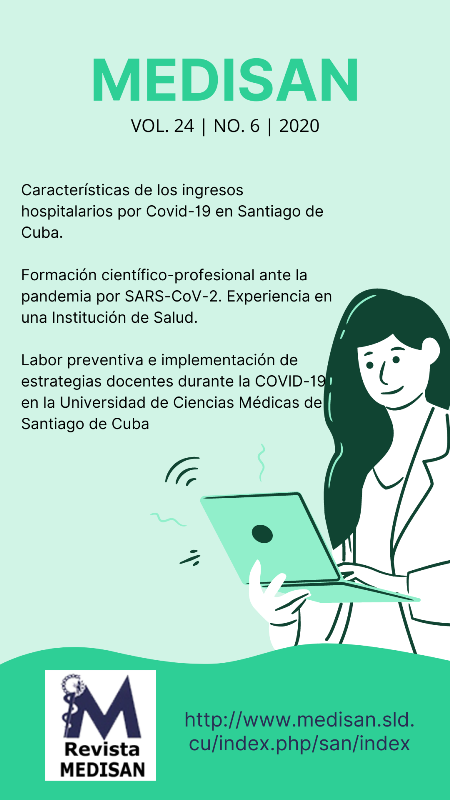Glossary of terms related to gender perspective in health sciences
Keywords:
gender, gender equality, gender perspective, equality, understanding, semantic and grammatical shades, language.Abstract
Introduction: Gender analysis in the different aspects of life, specially in the health sciences, is more and more frequent. Many studies have been carried out, from gender perspective in the social, economic, productive and political sphere which may be reviewed through different ways and, in many cases, create doubts as their meanings are unknown, what makes difficult their conceptualization according to the context in which they are created, or they are wrongly used as synonyms. It is necessary to gather information on the topic to unify criteria on them
Objective: to systematize the related concepts, through knowledge management, with gender perspective in the health sciences by means of a glossary for health science.
Method: A retrospective and cross-sectional study was carried out by means of the documental analysis to first impact journals, literature review, as well as through experiences from scientific events and congresses. Key word as gender perspective, health sciences, gender equality, gender, glossary. Searches were made in Scopus, Latindex, EBSCO Health, PubMed (browser), SciELO and PsycINFO.
Development: Each term related to gender perspective frequently used in health sciences was analyze.
Conclusions: The conceptualization carried out contributes to the understanding of terms after systematizing them. A glossary of terms with gender perspective in health sciences was achieved.
Downloads
References
2. Pérez Duarte A. Glosario de género. Instituto Nacional de Mujeres.[en línea].2007 [citado 10/06/2019]:192. Disponible en http://cedoc.inmujeres.gob.mx/documentos_download/100904.pdf
3. Bouvair S. El segundo sexo [En línea]. España: Edit Cátedra; 2017 [citado 10/06/2019]. Disponible en: https://www.catedra.com/libro/feminismos/el-segundo-sexo-simone-de-beauvoir-9788437637365/
4. De la Cerda S, Sánchez E. Programas sociales de género, análisis de su estructuración. Rev La ventana. 2017 [citado 10/06/2019];15(46). Disponible en: http://www.scielo.org.mx/scielo.php?script=sci_arttext&pid=S1405-94362017000200286
5. Martínez López N. Estudio de la conciliación del área personal, familiar y profesional en enfermeros hospitalarios con carga familiar [tesis doctoral]. Murcia: Universidad de Murcia; 2017[citado 10/06/2019]. Disponible en: https://www.tdx.cat/bitstream/handle/10803/482135/TNML.pdf?sequence=1&isAllowed=y
6. Berga A. Los estudios sobre juventud y perspectiva de género. Rev Est Juv. 2015 [citado 10/06/2019]; 110:15-20. Disponible en: http://www.injuve.es/sites/.../revista110_10-estudios-juventud-y-perspectiva-de-genero.pdf
7. González Baltazar R. Relación entre género y calidad de vida laboral en profesionales de salud. Rev Psicogente. 2015 [citado 26/06/2019];18(33). Disponible en: http://www.scielo.org.co/scielo.php?pid=S0124-01372015000100005&script=sci_abstract&tlng=es
8. Valenzuela J. Buscando un mejoramiento en la Salud oral de los adultos mayores: ¿es necesaria una reforma alges 60 años? Rev Chil Salud Púb. 2015 [citado 10/06/2019];19(2). Disponible en: www.lenguasmodernas.uchile.cl/index.php/RCSP/article/viewArticle/36782
9. Zambrano M, Durán M. El efecto espejo: sexo, género y cuidado en las trayectorias profesionales y las jerarquías morales y laborales de la Antropología en Colombia. Revcolombsoc. 2017 [citado 10/06/2019];40(2). Disponible en: http://dx.doi.org/10.15446/rcs.v40n2.66386
10. Díaz I, Echevarría D. Gestión empresarial y género: oportunidades y retos para Cuba. Rev Econo y Desarrollo. 2016 [citado 26/06/2019]; 157(2). Disponible en: http://scielo.sld.cu/scielo.php?script=sci_arttext&pid=S0252-85842016000200003
11. Sau V. Diccionario ideológico feminista. Barcelona: Editorial Icaria; 1989.
12. Linares BC, Nazar A, Sánchez G, Zapata E, Salvatierra B. La no-maternidad en México. El rol del género y la desigualdad socioeconómica. Rev PSM. 2017 [citado 10/06/2019];15(1). Disponible en: http://dx.doi.org/10.15517/psm.v15i1.26413
13. Becerra C. Calidad de empleo con enfoque de género: propuesta de un marco conceptual. Rev Cuestiones de género: de la igualdad y la diferencia. 2015 [citado 10/06/2019]; (10). Disponible en: http://revpubli.unileon.es/ojs/index.php/cuestionesdegenero/article/view/1177
14. Mingo A, Moreno H. Sexismo en la universidad. Rev La ventana. 2017 [citado 10/06/2019];35(105). Disponible en: http://dx.doi.org/10.24201/es.2017v35n105.1434
15. Londoño J. Mujeres y Participación Política. Rev Cuba Inf. 2016 [citado 10/06/2019]. Disponible en: http://azulinaciones.blogspot.com/2007/08/mujeres-y-participacin poltica.html.
16. Macias L. Educación, feminismo y liderazgo. Entrevista a Lily Eskelsen García. Rev La ventana. 2017 [citado 26/06/2019]; 5(46). Disponible en: http://www.scielo.org.mx/scielo.php?script=sci_arttext&pid=S1405-94362017000200340
17. Álvarez M. Los estudios de género en Cuba: ¿Dónde estamos y hacia dónde vamos? Rev Anales de la Academia de Ciencias de Cuba. 2016 [citado 26/06/2019]; 6(2). Disponible en: http://www.revistaccuba.cu/index.php/revacc/article/download/344/344
18. Álvarez Cruz EM. El machismo femenino o femichismo. 2016 [citado 10/06/2019] Disponible en: http://www.prepa5.unam.mx/wwwP5/profesor/publicaciones/elMachismoFemeninoOFemichismo.pdf
19. Tassadit Y. Dominación real o simbólica: nueva revisión de La Domination masculine. Rev. interdiscip. estud. género Col. 2017 [citado 10/06/2019];3(6). Disponible en: http://dx.doi.org/10.24201/eg.v3i6.176
20. Natalia L. Comunicación, infancia y adolescencia. Perspectiva de género. Fondo de las Naciones Unidas para la Infancia (UNICEF). 2017 [citado 10/06/2019]. Disponible en: https://www.unicef.org/argentina/spanish/COM-1_PerspectivaGenero_WEB.pdf
21. Suárez D. No hay Sócrates sin Diotima: sobre androcentrismo y sexismo en filosofía. Econ Fem. 2017 [citado 10/06/2019] Disponible en: http://economiafeminita.com/no-hay-socrates-sin-diotima-sobre-androcentrismo-y-sexismo-en-filosofia/
22. Barrientos F. El androcentrismo de los movimientos revolucionarios y su materialización en el contexto del movimiento estudiantil en Chile. La Boina. 2017 [citado 10/06/2019]; (6). Disponible en: https://periodicolaboina.wordpress.com/2017/08/16/el-androcentrismo-de-los-movimientos-revolucionarios-y-su-materializacion-en-el-contexto-del-movimiento-estudiantil-en-chile/
23. Nuño Gómez L, Álvarez Conde E. Androcentrismo académico: la ficción de un conocimiento neutral. Femin. 2017 [citado 10/06/2019]; 29. Disponible en:
http://dx.doi.org/10.14198/fem.2017.29.11
24. Rodríguez Sotomayor Y, Pardo Fernández A, Mondelo López I. Concepción epistemológica emergente de equidad de género en el envejecer de la mujer. Rev inf científica. 2018 [citado 10/06/2019];97(4). Disponible en: http://www.revinfcientifica.sld.cu/index.php/ric/article/view/1807
25. Curiel S. Violencia, misoginia y caballerosidad. Cultura, Cultura hoy mañana y siempre. 2017 [citado 10/06/2019]. Disponible en: http://www.siempre.mx/2017/05/violencia-misoginia-y-caballerosidad/
26. Castañeda Abascal I. El marco teórico en la investigación en salud con enfoque de género. Rev Cubana de Salud Pública. 2014 [citado 10/06/2019];40(2). Disponible en: http://scielo.sld.cu/scielo.php?script=sci_arttext&pid=S0864-34662014000200009&lng=es
27. Pacheco Carpio C, Cabrera Albert J, Mazón Hernández M, González López I, Bosque Cruz M. Estereotipos de género sexistas. Un estudio en jóvenes universitarios cubanos de medicina. Rev Ciencias Médicas. 2014 [citado 10/06/2019];18(5). Disponible en: http://scielo.sld.cu/scielo.php?script=sci_arttext&pid=S1561-31942014000500015
28. Castañeda Abascal IE. Reflexiones teóricas sobre las diferencias en salud atribuibles al género. Rev Cubana Salud Pública Epidemiol. 2007 [citado 10/06/2019];33(2). Disponible en: http://scielo.sld.cu/scielo.php?script=sci_arttext&pid=S0864-34662007000200011
Published
How to Cite
Issue
Section
License
All the articles can be downloaded or read for free. The journal does not charge any amount of money to the authors for the reception, edition or the publication of the articles, making the whole process completely free. Medisan has no embargo period and it is published under the license of Creative Commons, International Non Commercial Recognition 4.0, which authorizes the copy, reproduction and the total or partial distribution of the articles in any format or platform, with the conditions of citing the source of information and not to be used for profitable purposes.





